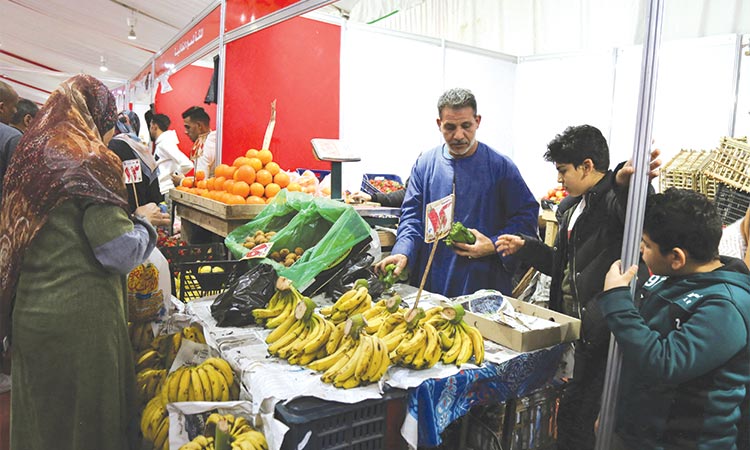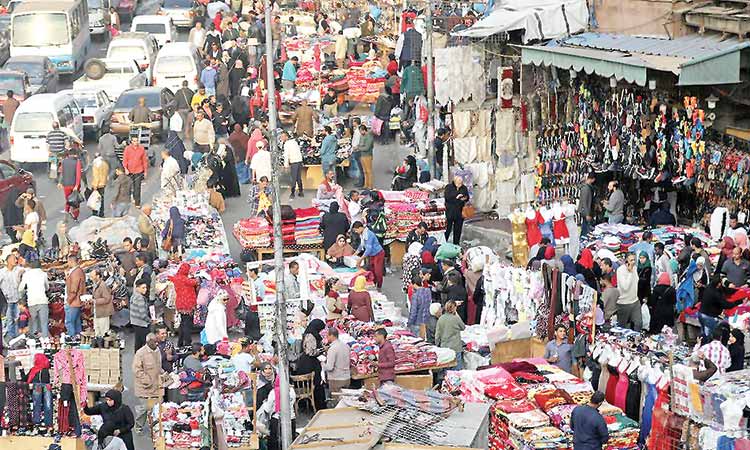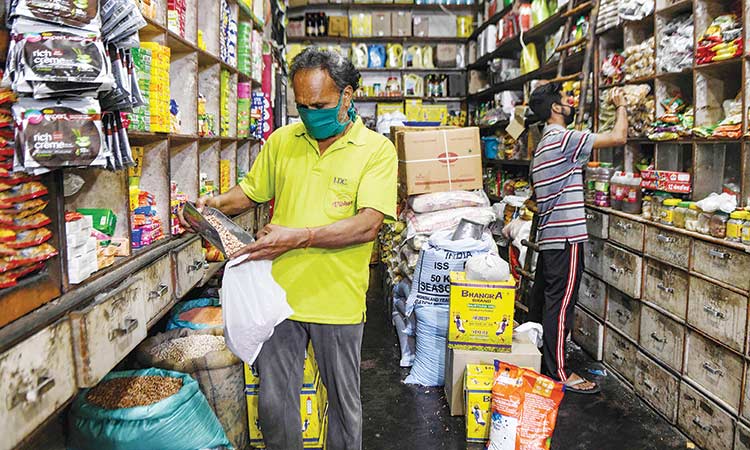Egypt’s consumer price inflation slows to 33.3 per cent in March

People buy fruits from a market selling food at discounted prices in Giza, Egypt. Reuters
A poll of 12 analysts had expected annual inflation to climb to a median 36.3 per cent as prices adjusted to a currency devaluation as well as an interest rate hike in early March and an increase in fuel prices two weeks later.
The central bank on March 6 allowed the Egyptian pound to fall to about 50 to the dollar from 30.85, where it had been fixed for the past 12 months. It has since strengthened to 47.60 per dollar.
The government raised prices on a wide range of fuel products on March 22 as it pressed ahead with a commitment made to the International Monetary Fund more than a year earlier to allow most domestic prices to rise to international levels.
Inflation has been elevated for the past year, driven largely by rapid growth in the money supply. Annual inflation reached a historic high of 38.0 per cent in September.
Food prices edged up by a monthly 0.7 per cent in March after having jumped by 15.9 per cent in February. On an annual basis, food prices rose by 45 per cent in the year to March.
Meanwhile the IMF said that it will tie payments to Egypt under an $8 billion financial programme to Cairo’s letting market conditions determine the price of its currency and its making foreign exchange available to businesses and private individuals.
Egypt, which signed the loan agreement on March 6, will have immediate access to $820 million this week and another $820 million after a review to be completed by the end of June.
Subsequent reviews will be made every six months, with each unlocking payments of $1.3 billion provided certain conditions are met, with the last payment in autumn of 2026, mission chief Ivanna Vladkova Hollar told a news conference.
The International Monetary Fund’s executive board approved the programme, expanding on a $3 billion Extended Fund Facility signed in December 2022 after the crisis in neighbouring Gaza further shook Egypt’s already precarious economy.
Egypt allowed its currency to weaken sharply after the 2022 agreement, but within months had re-pegged it to the dollar, prompting the IMF to put the programme on hold.
Under last month’s agreement Egypt again let its currency plunge and has since let its price fluctuate.
“This is an important reform that needs to be sustained. It’s not a one-off reform,” Hollar said.
“At each individual review, the expectation is that the conditions that we’re seeing now in the market are going to continue to hold, in the sense that we do not see a return to a system of FX rationing and lack of FX availability,” she said.
The Gaza crisis exacerbated Egypt’s chronic foreign crisis by slowing tourism growth and triggering attacks from Yemen on shipping in the Red Sea, halving Suez Canal revenue. Tourism and canal revenue are two of its main sources of foreign exchange.
Among other reforms the IMF is seeking is that Egypt ensure a level playing field between private and state firms and that the state reduce its role in the economy.
An additional loan from the IMF’s Resilience and Sustainability Facility would be discussed during the next review, Vladkova Hollar said.
The next review of Egypt’s IMF loan programme should be completed by the end of June, when authorities will be able to draw on a further $820 million, an IMF official said on Monday, after an expanded loan programme was agreed last month.
Further reviews will be completed every six months, and those will each unlock disbursements of $1.3 billion, mission chief Ivanna Vladkova Hollar said in a news conference.
An initial payment of $820 million would be received this week, after the completion of delayed reviews last month, Egypt’s prime minister said on Friday.
A additional loan from the IMF’s Resilience and Sustainability Facility would be discussed during the next review, Vladkova Hollar said. The final review of the loan programme would be in the final months of 2026, she added.
Egypt’s inflation forecast is expected to remain high in the near term, with average inflation for the next fiscal year forecast at 25.5 per cent, she said.
The country, whose budget has been stretched in recent years, needs to replace untargeted fuel subsidies with targeted social spending, she said.







